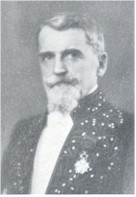- Birthdate
- 1868/11/19
- Birthplace
- St. Michel, Savoy, France
- Death date
- 1932/02/16
- Fields of study
- Telegraphy, Radio
Biography
Gustave-Auguste Ferrie was born on 19 November 1868, at St. Michel, Savoy, France. After graduating from Polytechnical School in 1891, he became an officer in the Engineers Corps of the French Army.
Ferrie headed the French Radiotelegraphie Militaire before and during World War I, a period when he made extraordinary advances in the field of radio communication. Engineers had long known that telegraph signals could travel a few hundred yards through the ground, but little use had been made of this form of wireless communication. In 1914, Ferrie recognized two things: the newly available electron tube could significantly extend the range of this technique; and it might then be of enormous value in the fighting on the Western Front. Thus was born ground telegraphy or Earth-currents signaling.
Ferrie made improvements in the signal generator and in the receiver - notably by the use of a triode amplifier - and achieved a usual range of several kilometers. The transmitter was essentially a buzzer (an electromechanical device that interrupts the circuit at a very high rate) powered by a battery. The receiver was an amplifier, employing a triode electron tube. Earth connections were usually made by driving steel pins into the ground; often a short length of insulated wire was laid along the ground and anchored at each end by a spike. These devices began to be used in large numbers in 1916, and by the end of the war the French had produced almost 10,000 of them for use by the Allies.
Ferrie was made a General in 1919, and continued in the service for the rest of his life, exempted from the restrictions of the age limit ruling in accordance with a special law enacted in 1930. He received on Honorary Doctor's degree from Oxford University in 1919, and was a member of the Academy of Sciences since 1922. He was president of the International Scientific Radio Union (U.R.S.I.), the International Commission on Longitudes by Radio, and Vice President of the International Board of Scientific Unions. He became a Fellow of the Institute of Radio Engineers in 1917.
Ferrie was awarded the IRE Medal of Honor in 1931, 'For his pioneer work in the field of radio measurements, his constructive influence on laboratory practice in communication engineering, and his unfailing support of the aims and ideals of the Institute.' He died on 16 February 1932.
